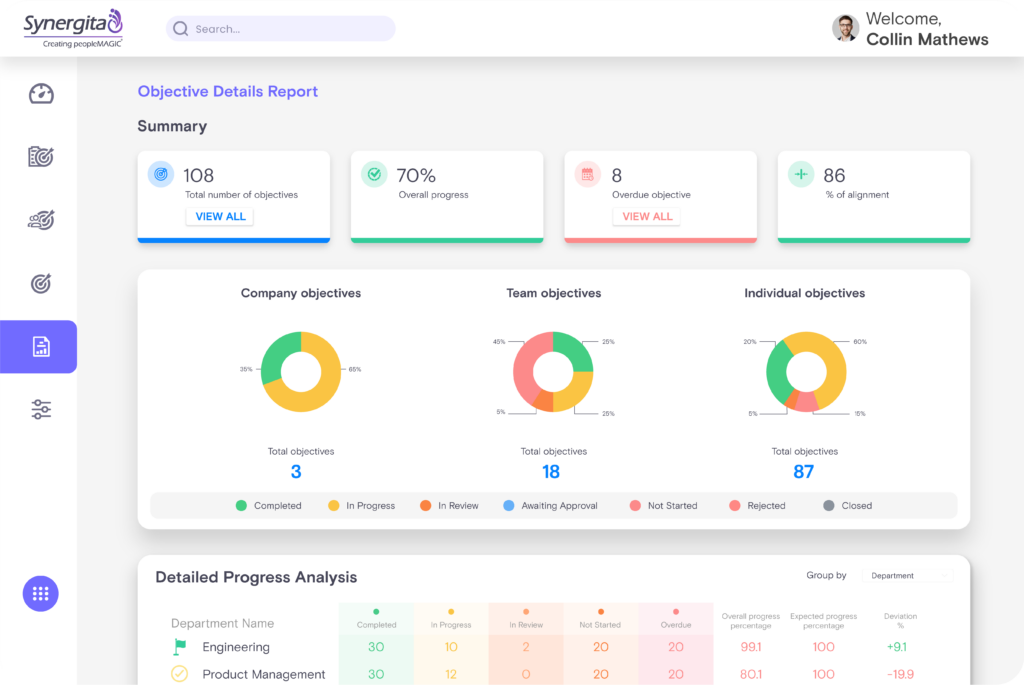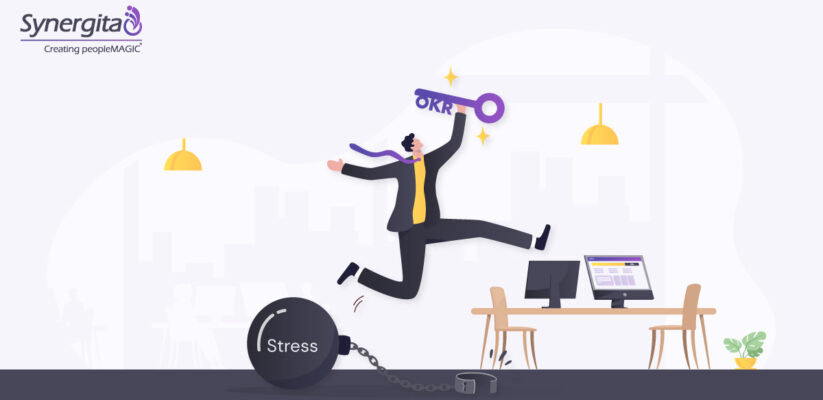Building a Growth Mindset: Transforming Your Potential with OKRs
In today’s business environment, a growth mindset is crucial for success. As Frank Zappa wisely said, ‘A mind is like a parachute. It doesn’t work if it isn’t open.’ The quote stresses the belief that abilities and intelligence can be developed through dedication and continuous learning. To foster this mindset, organizations can adopt the Objectives and Key Results (OKR) framework. OKR, popularized by Intel and embraced by companies like Google, promotes personal and organizational growth. By setting clear objectives and measurable key results, OKR aligns efforts, fosters collaboration, and nurtures a culture of improvement. It inspires individuals to think beyond their comfort zones, promotes accountability and transparency, and facilitates ongoing learning and growth. This blog post will take you through the benefits of adopting growth OKRs to build a growth mindset in a corporate setting.
OKR, popularized by Intel and embraced by companies like Google, promotes personal and organizational growth. By setting clear objectives and measurable key results, OKR aligns efforts, fosters collaboration, and nurtures a culture of improvement. It inspires individuals to think beyond their comfort zones, promotes accountability and transparency, and facilitates ongoing learning and growth. This blog post will take you through the benefits of adopting OKR to build a growth mindset in a corporate setting.
Concept of Growth Mindset and its Importance
A growth mindset is the belief that our abilities can be developed through effort and continuous learning. The importance of a growth mindset cannot be overstated. It is the driving force behind personal and professional development, enabling individuals to overcome self-imposed limitations and achieve extraordinary success.
A growth mindset is essential because it allows us to:
- Overcome limitations.
- Embrace challenges as opportunities.
- Learn from failures.
- Be innovative.
- Foster collaboration.
- Support and challenge each other.
When individuals believe in their capacity to develop and improve, they become more open to feedback, more willing to take risks, and are more likely to engage in continuous learning. This mindset creates a culture of growth within teams and organizations, where individuals support and challenge each other to reach new heights.
Understanding the Growth Mindset
The growth mindset is a belief system that recognizes the potential for growth and development through effort, learning, and embracing challenges. Key aspects of the growth mindset include:
- Belief in Growth: Abilities and intelligence can be developed and improved over time.
- Embracing Challenges: Challenges are viewed as opportunities for growth and learning.
- Persistence and Effort: Putting in the necessary work and maintaining focus lead to progress.
- Learning from Failure: Failure is seen as a steppingstone to improvement and feedback.
- Embracing Feedback: Feedback is valued and utilized for personal growth and development.
- Love for Learning: A lifelong desire to acquire new knowledge and skills.
- Nurturing Resilience: Bouncing back from setbacks and maintaining a positive attitude.
By adopting a growth mindset, individuals unlock their potential, cultivate resilience, and embrace continuous improvement.
Impact of Mindset on Personal and Professional Growth
Mindset profoundly affects personal and professional growth. It shapes our growth journey, imparting resilience, learning, innovation, collaboration, and overall development. Embracing a growth mindset unlocks transformative potential for success and helps you in:
- Believing in your Potential: A growth mindset drives belief in our capacity to improve and succeed.
- Resilience and Adaptability: It enables us to bounce back, embrace change, and navigate challenges.
- Learning and Skill Development: A growth mindset fosters continuous learning and skill enhancement.
- Innovation and Creativity: It promotes exploration, risk-taking, and innovative thinking.
- Collaboration and Teamwork: A growth mindset cultivates a supportive environment for collaboration and collective growth.
- Overcoming Limitations: It empowers us to surpass self-imposed boundaries.
- Continuous Improvement: A growth mindset fuels our drive for feedback, growth opportunities, and ongoing progress.

The Role of OKRs in Cultivating a Growth Mindset
OKRs play a pivotal role in developing a growth mindset. They contribute to developing a growth mindset in the following ways:
- Clear Goals: OKRs provide clear and ambitious objectives that push individuals beyond their comfort zones, fostering growth.
- Focus on Learning: OKRs emphasize the process of learning and improvement, encouraging individuals to embrace challenges and develop their skills.
- Feedback and Adaptability: Regular check-ins and progress updates associated with OKRs create opportunities for feedback and adjustment, promoting a growth-oriented mindset.
- Encouragement of Risk-Taking: OKRs create a culture where calculated risks are valued, motivating individuals to explore new ideas and approaches.
- Collaboration and Support: OKRs promote transparency and collaboration, fostering a supportive environment for growth and collective problem-solving.
Growth OKRs serve as a powerful tool for unlocking potential, driving growth, and cultivating a mindset that embraces challenges, values learning, and promotes innovation and collaboration.
Setting Growth-Focused Objectives
Setting effective growth-focused objectives is key to driving personal and professional development. Following are some of the ways to create impactful objectives:
- Align with Your Purpose: Start by identifying your long-term goals and aspirations. Your objectives should align with your passions and values, ensuring that you are working towards meaningful outcomes.
- Make Them Specific and Measurable: Clearly define what you want to achieve and establish measurable criteria for success. Specific and measurable objectives provide clarity and enable you to track progress effectively.
- Challenge Yourself: Embrace ambitious objectives that push your boundaries and require you to acquire new skills or knowledge. Setting challenging goals motivates growth and encourages continuous improvement.
- Break Objectives into Actionable Steps: Breaking objectives into smaller, actionable steps allows for better planning and implementation, ensuring progress can be made in a practical and manageable manner.
- Set Timeframes and Deadlines: Establishing timeframes and deadlines creates a sense of urgency and provides a clear timeline for goal attainment, facilitating effective time management and increased productivity.
- Seek Feedback and Adjust Accordingly: Seeking feedback from others helps gain valuable perspectives, identify areas for improvement, and make necessary adjustments to stay on track towards achieving objectives.
Key Results for Measuring Growth
Key Results (KRs) are crucial for tracking progress and achieving growth. They are important for:
- Clearing Targets: KRs set specific, measurable goals for success and focus.
- Objective Evaluation: They provide an unbiased framework for assessing performance.
- Accountability and Transparency: KRs foster responsibility and open communication.
- Motivation and Engagement: They inspire active participation.
- Learning and Adaptation: KRs highlight areas for improvement and guide adjustments.
- Alignment and Collaboration: KRs align teams and promote synergy.
- Celebrating Achievements: KRs mark milestones and recognize accomplishments.
Key Results are vital in measuring growth, driving improvement, and maximizing success.
Leveraging growth OKRs for Skill Development and Learning
Growth OKRs provide a structured approach to building a growth mindset and drive skill development effectively. They empower skill development and learning through the following ways:
- Identify skills to develop.
- Set measurable objectives.
- Break tasks into milestones.
- Embrace learning opportunities.
- Emphasize growth and improvement.
- Track progress against Key Results.
- Celebrate milestones achieved.
Overcoming Challenges and Nurturing a Growth Mindset
To nurture a growth mindset and overcome challenges:
- Embrace Failure as Feedback: Learn from setbacks and use them to improve.
- Cultivate a Positive Mindset: Challenge negative thoughts and believe in your ability to grow.
- Seek Support and Collaboration: Surround yourself with like-minded individuals and collaborate for mutual growth.
- Set Realistic Expectations: Break down challenges and focus on making progress.
- Practice Resilience: Bounce back from setbacks, stay optimistic, and adapt to change.
- Seek Learning Opportunities: Approach challenges with curiosity and a willingness to learn.
- Reflect and Celebrate: Reflect on experiences, adjust strategies, and celebrate small victories.
Developing a growth mindset involves embracing failure, cultivating positivity, seeking support, setting realistic expectations, practicing resilience, seeking learning opportunities, and reflecting on progress.
Cultivating a Sustainable Growth Mindset
Cultivating a sustainable growth mindset involves embracing continuous learning, adaptability, and resilience to foster long-term personal and professional development. It requires prioritizing self-care and surrounding yourself with growth-minded individuals who inspire and support your journey. Following are some of the steps to build a growth mindset across organizations:
- Learn continuously: Embrace challenges and acquire new knowledge and skills.
- Adapt to change: Be open to new ideas and adjust strategies accordingly.
- Build resilience: Bounce back from setbacks and maintain a positive outlook.
- Prioritize self-care: Sustain mental and physical energy.
- Set meaningful goals: Align with values, break into achievable steps, and review regularly.
- Seek inspiration and support: Surround yourself with growth-minded individuals.
- Celebrate milestones: Reinforce a positive mindset and motivation.
Conclusion
In today’s rapidly evolving business landscape, cultivating a growth mindset is imperative for personal and professional success. By adopting a growth mindset and harnessing the power of growth OKRs, individuals and organizations can unlock their full potential, overcome limitations, foster innovation, and drive continuous growth. A growth mindset enables individuals to embrace challenges, learn from failures, collaborate effectively, and constantly strive for improvement.
OKRs provide a framework that supports goal-setting, learning, feedback, and measurement, promoting a culture of growth and development. By embracing a growth mindset and leveraging OKRs, individuals and organizations can embark on a transformative journey of continuous learning, adaptability, and resilience, leading to sustained growth and the achievement of long-term goals.
“Success is not final, failure is not fatal: It is the courage to continue that counts.” – Winston Churchill
FAQs:
Q1: How can a growth mindset benefit individuals and organizations?
A growth mindset empowers individuals and organizations by fostering resilience, embracing challenges, learning from failures, promoting innovation, and driving continuous improvement.
Q2: What is the role of OKRs in cultivating a growth mindset?
OKRs play a key role in cultivating a growth mindset by providing clear objectives, emphasizing learning and improvement, encouraging feedback and collaboration, and measuring progress effectively.
Q3: How can individuals set effective growth-focused objectives?
To set effective growth-focused objectives, align them with purpose, make them specific and measurable, and set ambitious goals that push boundaries and require skill development.
Q4: Why are key results important for measuring growth?
Key results are crucial for measuring growth as they provide specific, measurable goals, promote accountability and transparency, inspire motivation, guide improvements, and foster collaboration.
Q5: How can OKRs be leveraged for skill development and learning?
OKRs can be leveraged for skill development and learning by identifying target skills, setting measurable objectives, breaking tasks into milestones, embracing learning opportunities, tracking progress, and celebrating achievements.
Q6: What strategies foster a growth mindset and overcome challenges?
Strategies for fostering a growth mindset and overcoming challenges include embracing failure as feedback, cultivating a positive mindset, seeking support and collaboration, setting realistic expectations, practicing resilience, seeking learning opportunities, reflecting on experiences, and celebrating milestones.
Q7: How can a sustainable growth mindset be cultivated?
Cultivating a sustainable growth mindset involves continuous learning, adaptability, resilience, self-care, setting meaningful goals, seeking inspiration and support from growth-minded individuals, and celebrating milestones to reinforce a positive mindset.
